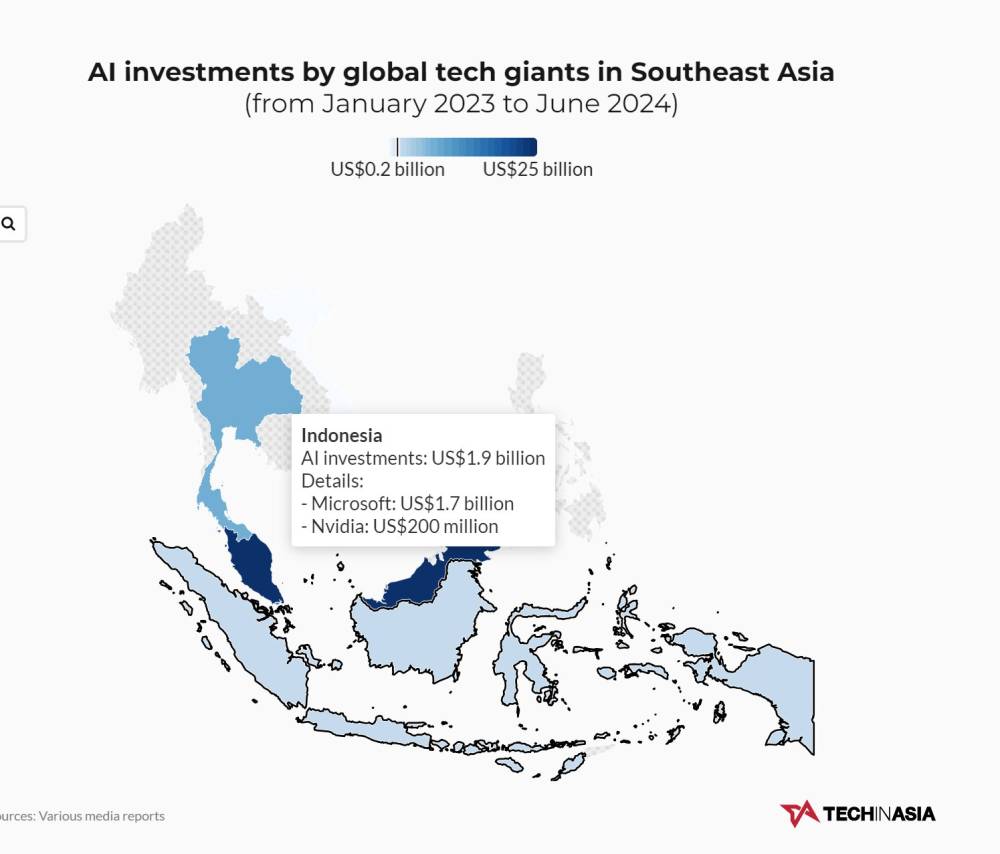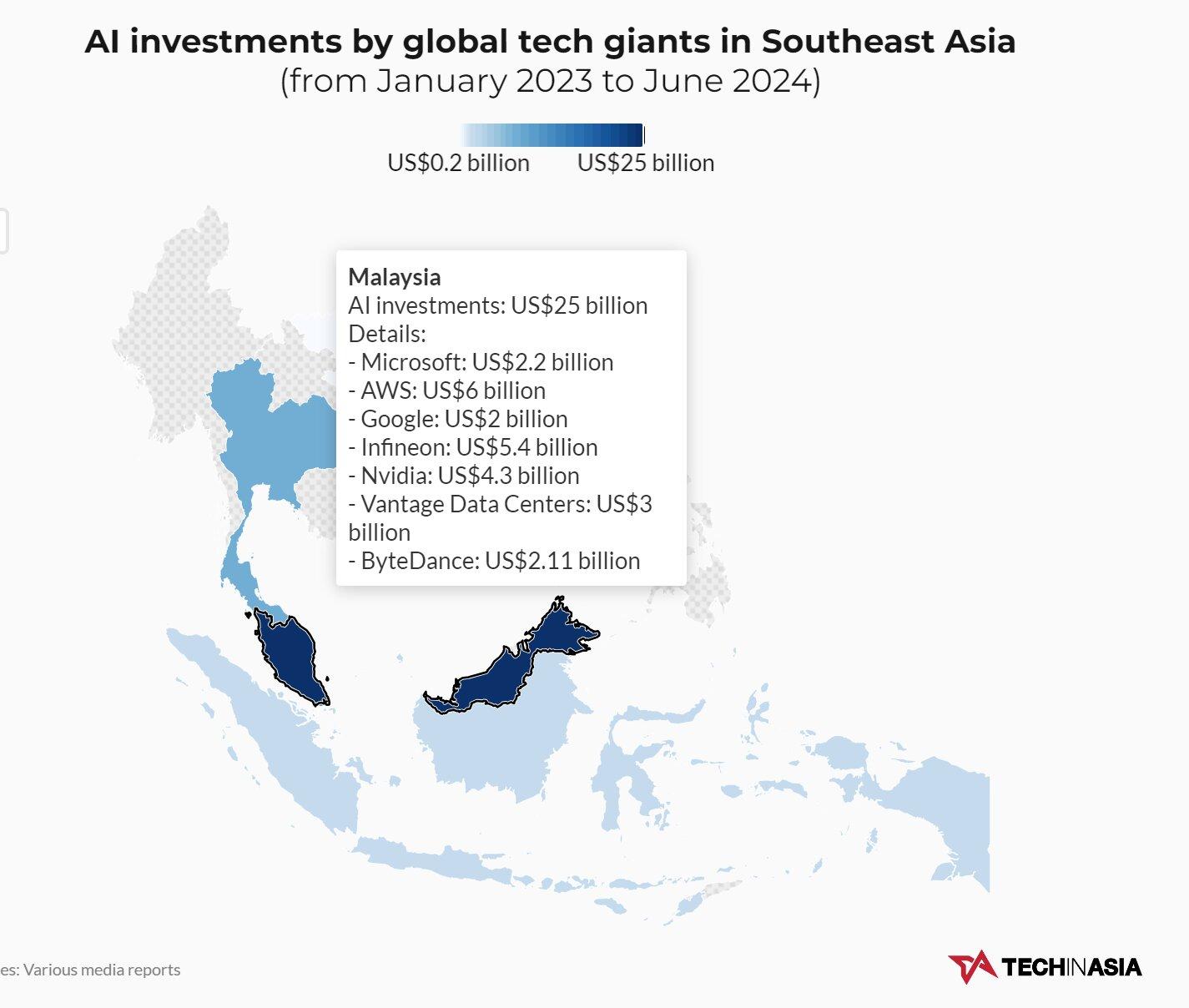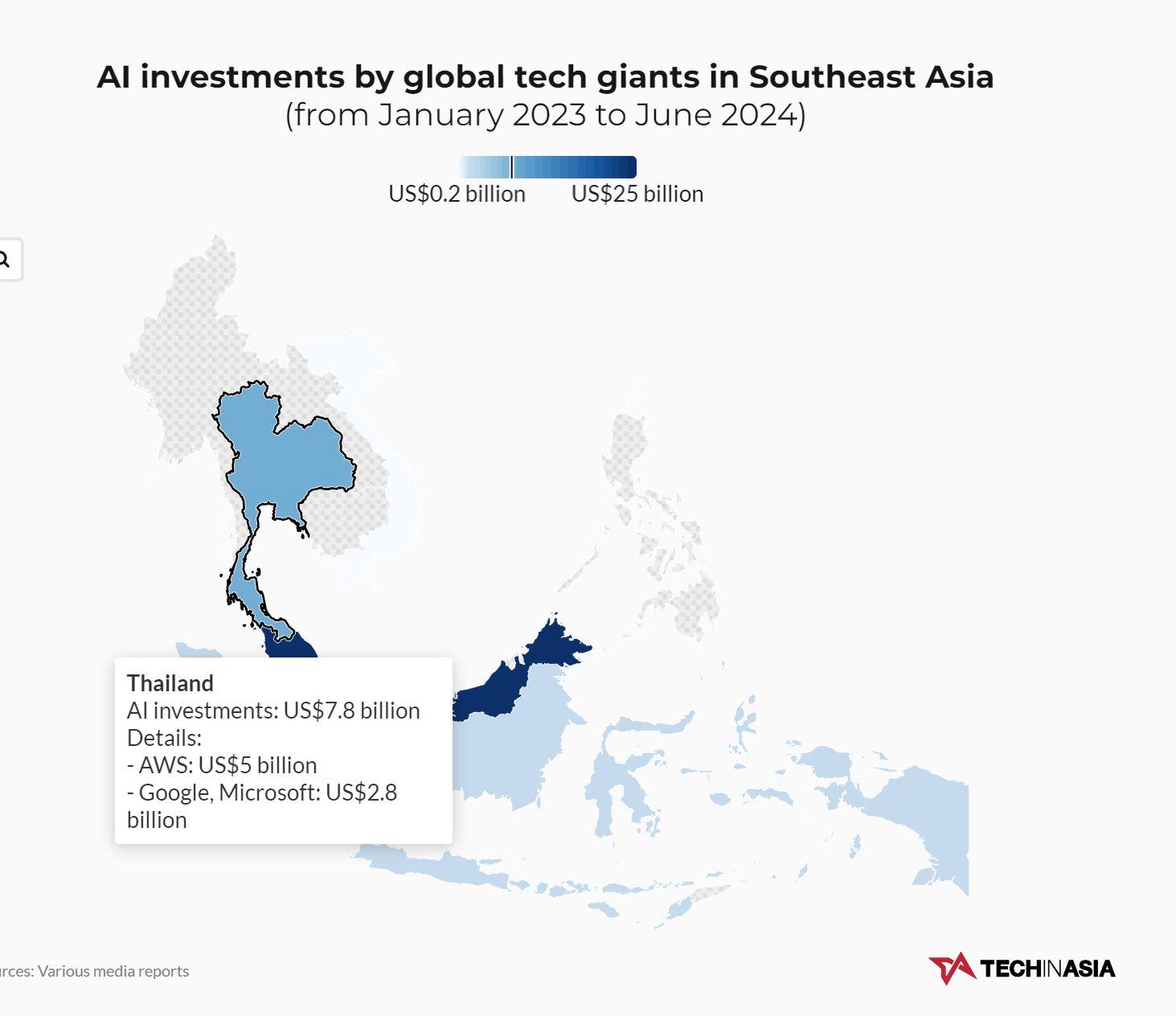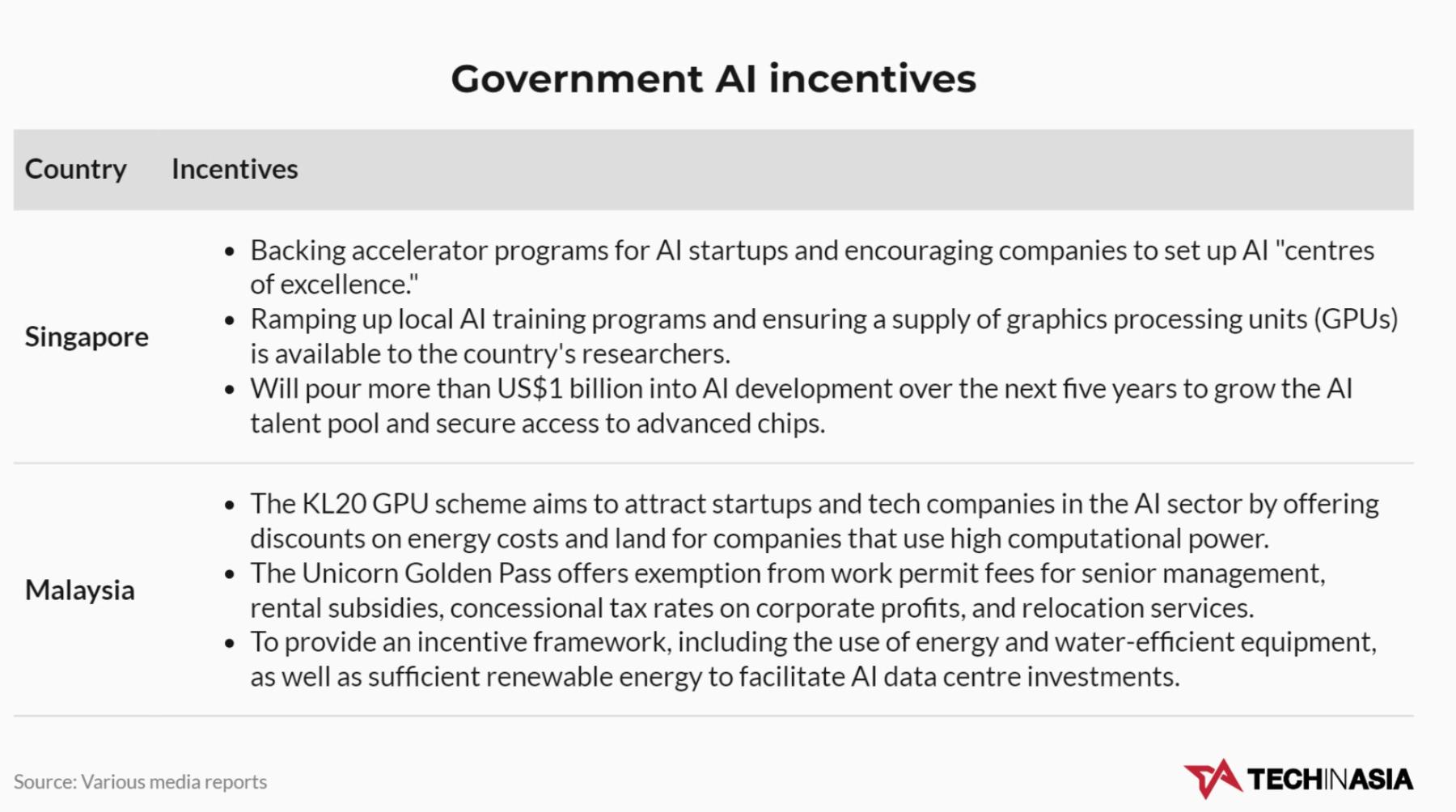
Indonesia đang tụt hậu trong đầu tư AI ở Đông Nam Á
• Từ năm 2023, các gã khổng lồ công nghệ như Microsoft, Google và Amazon đã cam kết đầu tư 51,5 tỷ USD vào AI ở Đông Nam Á. Tuy nhiên, chỉ 1,9 tỷ USD (3,7%) đổ vào Indonesia, dù đây là thị trường lớn nhất khu vực.
• Indonesia hấp dẫn ít đầu tư AI hơn các nước láng giềng nhỏ hơn do một số hạn chế:
• Cơ sở hạ tầng AI còn hạn chế, số lượng nhà sản xuất chip AI ít hơn nhiều so với các nước láng giềng.
• Thiếu nguồn nhân lực có kỹ năng để triển khai AI. Theo OECD, chỉ 1,1% thành viên LinkedIn ở Indonesia có công việc/kỹ năng liên quan đến AI vào năm 2022.
• Phần lớn nhân tài AI tập trung ở các thành phố lớn, làm chậm quá trình áp dụng công nghệ này trên cả nước.
• Thiếu các quy định cụ thể cho từng ngành. Chính phủ mới chỉ ban hành hướng dẫn đạo đức, chưa có hiệu lực pháp lý. Dự kiến sẽ có quy định toàn diện vào cuối năm nay.
• Quy trình cấp phép phức tạp, kéo dài và ưu đãi cho dự án AI còn hạn chế, không như Singapore và Malaysia.

• Nhận thức về quyền riêng tư và bảo mật dữ liệu còn thấp. Gần đây, trung tâm dữ liệu quốc gia bị hack, làm xấu đi nhận thức về khả năng bảo vệ dữ liệu công dân.

• Để thu hút đầu tư AI, Indonesia cần:
• Thu hút các công ty sản xuất chip AI đến hoạt động, tăng cường chuỗi cung ứng và giảm phụ thuộc vào chip nhập khẩu.
• Phát triển nhân tài AI trong nước, nâng cao nhận thức công chúng về AI.
• Chuẩn bị quy định và ưu đãi hỗ trợ đầu tư AI, đơn giản hóa quy trình cấp phép.
• Tăng cường chuỗi cung ứng công nghệ dựa trên AI và nâng cao năng lực nhân tài AI phù hợp xu hướng toàn cầu.
• Tạo môi trường để nhân tài công nghệ địa phương thảo luận và chia sẻ kiến thức AI, đi kèm với nỗ lực khuyến khích áp dụng AI.

📌 Indonesia đang tụt hậu trong đầu tư AI ở Đông Nam Á, chỉ chiếm 3,7% tổng đầu tư 51,5 tỷ USD. Nguyên nhân chính là hạn chế về cơ sở hạ tầng, nhân tài và quy định. Cần thu hút sản xuất chip AI, phát triển nhân lực và cải thiện môi trường đầu tư để bắt kịp.

https://www.techinasia.com/indonesia-trails-ai-investment-southeast-asia
Why Indonesia trails in AI investment in Southeast Asia US$51.5 billion.
That’s how much tech giants like Microsoft, Google, and Amazon have committed to pouring into AI-related investments in Southeast Asia since 2023, according to Tech in Asia data. However, the majority of these investments are not flowing into Indonesia, despite being the region’s largest market as well as the biggest contributor to Southeast Asia’s digital economy. Of the US$51.5 billion figure, only US$1.9 billion went to AI-related investments in Indonesia, or just 3.7% of the total. This came from two sources: Microsoft with US$1.7 billion and Nvidia with US$200 million. Why is Indonesia attracting less AI investment than its smaller neighbors? Limitations of infrastructure and talent One of the main reasons is the country’s still limited AI infrastructure. For example, the number of AI chip manufacturers in Indonesia is far fewer compared to its neighbors. Gregorius Natanael, an AI researcher from Bina Nusantara University, believes that Indonesia also lacks skilled human resources for AI implementation. According to data from the OECD, Indonesia’s AI talent concentration – which it defines as the percentage of LinkedIn members in the country with AI-related jobs and/or skill sets – stood at only 1.1% in 2022. Natanael also notes that most AI talent in Indonesia are based in big cities, which slows down adoption of the tech in the country. Another reason for the low level of AI-related investment is the lack of industry-specific regulations. Muhammad Angga Muttaqien, CEO of Indonesia AI, argues that investor interest is influenced by a country’s readiness for AI development. So far, the Indonesian government has only issued ethical guidelines that businesses should follow in using and developing AI, but which do not have the force of law. It plans to issue comprehensive regulations by the end of this year. In contrast, Singapore and Malaysia already have roadmaps for AI development in their countries, which include regulatory frameworks. In addition, lengthy and complex licensing processes often become investment barriers in Indonesia. Not to mention the still limited incentives for AI-related projects in the country, unlike in Singapore and Malaysia. Indonesia AI’s Muttaqien adds that awareness of privacy and data security in the country is still low. According to him, this is important because AI often involves data processing. Recently, Indonesia’s national data center was hacked, causing data in government agencies to be locked. This issue could worsen the perception of the country’s readiness to protect its citizens’ data. What to do Attracting AI chip manufacturing companies to operate in Indonesia is one way to drive more investment into the country. With more chipmakers, the AI ecosystem will be stronger, as they will bolster local supply chains such as semiconductor fabrication, hardware assembly, and software development. In addition, having local manufacturers will reduce costs by decreasing dependence on imported chips. Their presence can also lead to the development of innovation hubs and centers, drawing talent and investment into the country. See also: Charting big tech’s $70b spending spree in Southeast Asia To that end, Nvidia’s commitment to building an AI center in Surakarta could be a good start in setting an example for other companies. The US-based chipmaker is partnering with local telco Indosat Ooredoo Hutchison for the development of the AI center. Previously, the two companies had collaborated to integrate Nvidia’s next-gen chip architecture, Blackwell, into Indosat’s infrastructure. The aim of this integration is to “propel Indonesia into a new era of sovereign AI and technological advancement,” said Indosat in a statement. Photo credit: amadeustx / Shutterstock Meanwhile, Microsoft aims to provide AI skilling opportunities to 840,000 people in the archipelago as part of its US$1.7 billion commitment. The company is also looking to develop new AI and cloud infrastructure in Indonesia. Indeed, Natanael from Bina Nusantara University notes that the government should develop AI talent domestically. This might be something as basic as raising public awareness about the tech and encouraging more people to use ChatGPT or other generative AI products. Indonesia AI’s Muttaqien adds that the government needs to prepare regulations and incentives that can support AI investment in Indonesia. He also calls for the licensing process to be streamlined, especially for AI investments. This wouldn’t be alien to the government, since streamlining bureaucracy in investment has been a “primary agenda” of theirs in the last two terms, Muttaqien tells Tech in Asia. In a report by local media Antara, Deputy Minister of Communications and Informatics Nezar Patria said that the government will strengthen the AI-based tech supply chain in Indonesia. He also noted that they will enhance AI talent in the country, in line with global trends. Patria emphasized the need to create an environment where local tech talent can continuously discuss and share their AI-related knowledge. However, this must be accompanied by efforts to encourage AI adoption. “This has already been a government commitment to harness all our potential to catch up and align with global developments,” said Patria.
Thảo luận
Follow Us
Tin phổ biến



